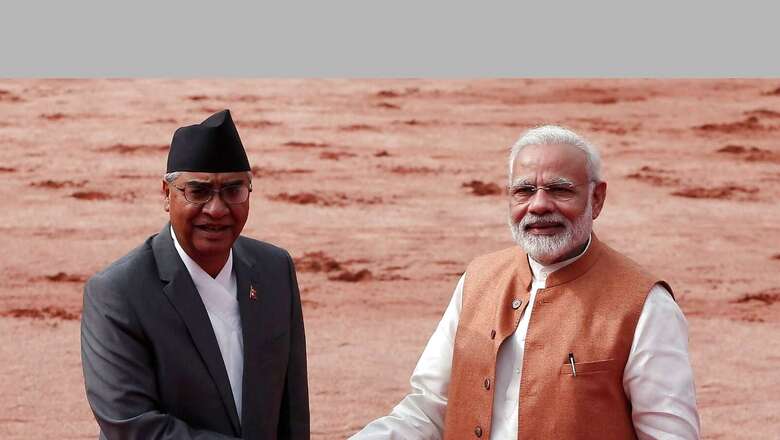
views
The three-day visit of Nepalese Prime Minister Sher Bahadur Deuba to India beginning Friday will provide an opportunity to review the “significant growth” in wide-ranging bilateral “cooperative partnership” and expand it further, the Ministry of External Affairs (MEA) said on Monday. Deuba, accompanied by his spouse Arzu Deuba, will pay an official visit to India from April 1 to 3 at the invitation of Prime Minister Narendra Modi.
A high-level delegation will accompany the Nepalese prime minister, the MEA said announcing the visit. “India and Nepal enjoy age-old and special ties of friendship and cooperation. In recent years, the partnership has witnessed significant growth in all areas of cooperation,” the MEA said in a statement. “The upcoming visit will provide an opportunity to the two sides to review this wide-ranging cooperative partnership and to progress it further for the benefit of the two peoples,” it said.
The MEA said Deuba will call on the Vice President and hold talks with Prime Minister Modi on April 2. National Security Advisor Ajit Doval and External Affairs Minister S Jaishankar will also call on the visiting leader. “Besides official engagements in New Delhi, the Prime Minister of Nepal will visit Varanasi,” the MEA said. It will be Deuba’s first bilateral visit abroad after becoming prime minister in July last year for a fifth time following a spell of political turmoil in Kathmandu.Deuba had visited India in each of his four earlier stints as prime minister of Nepal. His last visit to India in his capacity as prime minister was in 2017.
Nepal is important for India in the context of its overall strategic interests in the region, and the leaders of the two countries have often noted the age-old “Roti Beti” relationship. The country shares a border of over 1,850 km with five Indian states Sikkim, West Bengal, Bihar, Uttar Pradesh and Uttarakhand.
Land-locked Nepal relies heavily on India for the transportation of goods and services. Nepal’s access to the sea is through India, and it imports a predominant proportion of its requirements from and through India. The India-Nepal Treaty of Peace and Friendship of 1950 forms the bedrock of the special relations between the two countries. Ties between India and Nepal came under severe strain after Nepal published a new political map in 2020 that showed the three Indian territories – Limpiyadhura, Kalapani and Lipulekh – as part of Nepal.
India reacted sharply, calling it a “unilateral act” and cautioning Kathmandu that such “artificial enlargement” of territorial claims will not be acceptable to it. Foreign Secretary Harsh Vardhan Shringla visited Nepal in November 2020 with an aim to reset the ties. Shringla’s trip was followed by a visit to India by then Nepalese foreign minister Pradeep Kumar Gyawali.
Read all the Latest News India and Breaking News here




















Comments
0 comment